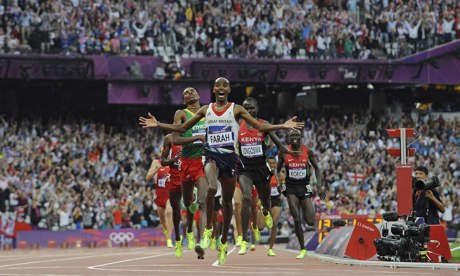Despite the "inspire a generation" rhetoric used to justify the investment in the London 2012 Olympics, new official figures show that the number of 16 to 25-year-olds playing sport has gone down since the Games.
The latest Active People survey from Sport England, which invests £300m a year of lottery and government funding in grassroots sport and has a specific remit to increase the number of young people playing, shows regular participation among 16 to 25-year-olds has declined by 53,000 over the past year to 3.74 million.
Amid heightened concern over a long-term increase in childhood obesity and the public-health implications of increasingly sedentary lifestyles, the numbers will make grim reading for those who claimed London 2012 would inspire more young people to play sport.
However, there will be relief for the government and the London 2012 organisers that the figures show a marginal increase in the number of people playing sport overall compared with those compiled just before the Games.
They suggest that the coldest March for 50 years, which hit the numbers published in April 2013 and led to a fresh wave of concerns about the direct pledge to increase the number of people playing sport through the Games, has not dented participation figures in the longer term.
Despite Andy Murray becoming the first British man to win Wimbledon in 77 years, tennis also continued to struggle to arrest a decline in participation, putting future funding at risk. The Lawn Tennis Association, whose new chief executive, Michael Downey, arrives from Canada next month, was one of a handful of governing bodies put in "special measures" by Sport England last year and warned that its funding would be cut if it did not improve its participation figures.
But Thursday's figures showed a decline from 423,400 to 406,000 in the past year. Since 2005, the number of people playing once a week has slumped from 457,200.
The number of people playing sport at least once a week is higher than at any time before the Games and, at 15.5 million, is 100,000 higher than the figure in April 2012. Sport England and the government prefer to highlight the fact that 1.5 million more adults are playing sport regularly than when the bid was won in 2005.
But the figures also show that while 12 sports have increased participation on a 12-month rolling basis compared with the previous set of figures in April, 19 have suffered a decline or seen no change. Football, cricket and netball have suffered the most and Sport England's chief executive, Jennie Price, warned that the FA, which receives £30m over four years from the organisation, had to "get its act together", particularly when it came to encouraging more young people to play.
She said that she had held four meetings with the FA general secretary, Alex Horne, on the subject in the past nine months and called on it to be more innovative, working more closely with local councils and commercial five-a-side operators.
"They don't have large-scale participation on the ground. They've got to build that core of regular participation," she said. The sports minister, Helen Grant, reiterated her warning that the governing bodies face having their funding cut if they fail to deliver.
The number of 16-year-olds and over playing football has gone down from 2.02 million to 1.84 million since 2005, when the Active People survey began.
Price said more emphasis would be placed on so-called "doorstep sport" schemes that appealed more to young people and more unusual offerings such as korfball, dodgeball, zumba and dance that had proved more popular than formal team sports. "We've got to give them a range and make sure it's not just a choice between sitting on the sofa and formal, organised sport," she said.
While insisting that Lord Coe, who promised to "inspire a generation" through London 2012, had provided a "great platform", Price admitted that most of the growth was being driven by an increase in informal exercise such as running, cycling and going to the gym.
Among the success stories, British Cycling trumpeted the fact that more than two million adults were now riding bikes at least once a week, making it the third most popular sport in Britain behind swimming and athletics, overtaking football.
"Yes, it's hard yards. But we have to remember we bumped along under 15 million for an awful long time. This is serious long-term behavioural change work," said Price.
An earlier promise to increase the number of people playing sport three times or more a week by one million, and a parallel promise by the NHS to increase the number of people taking exercise by the same number, were quietly dropped before the Olympics when it became clear they would not be met.
Other positive trends from the latest survey include a record number of disabled people playing sport at least once a week, up 62,000 in the past year to 1.67 million, and a record number of people from BME (black, Asian and minority ethnic) backgrounds, to 2.7 million.
"This shows that more people are continuing to play sport and the growth we saw in 2012 was not just a post-Olympic bounce. I am particularly pleased to see record numbers of disabled people playing sport, which is a real testament both to the impact of the Paralympics and our increased investment in the grassroots," said Price.
"We are concerned about the results for young people – although the majority of 16 to 25-year-olds still play sport regularly, the numbers are not going up. The evidence shows a sharp drop in the popularity of traditional sports like football and netball, and we need to make sure they have a wider range of sporting activities to choose from."
Grant said she was "encouraged" by the figures but said there was "more to be done", warning governing bodies that their funding would be withdrawn and channelled through other routes if they did not hit their targets. Sport England invests £493m over four years through governing bodies.
"Sports governing bodies must step up and deliver for the half a billion pounds of public money that they receive," said Grant. "If they don't, funding will be taken away and channelled into grassroots sport through other routes."
The MP Clive Efford, Labour's shadow minister for sport, said: "These damning figures underline the fact that David Cameron has no strategic plan for sport. His Tory-led Government have failed to capitalise on the explosion of enthusiasm generated by the Olympics and Paralympics. A golden opportunity is being squandered."











